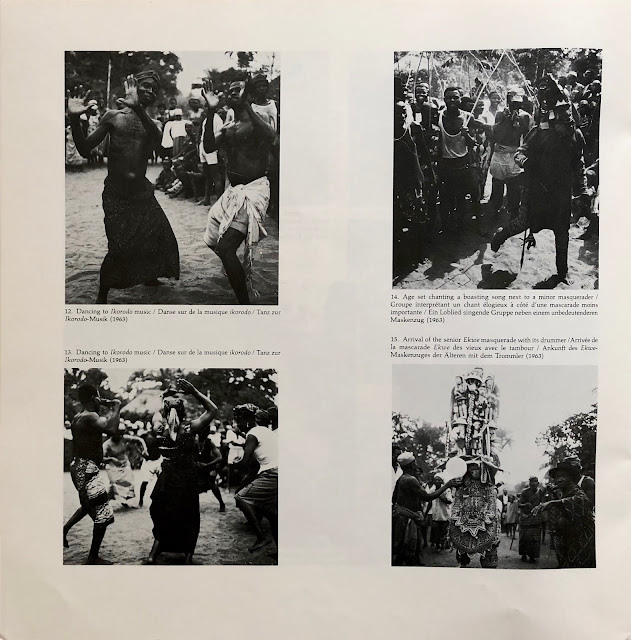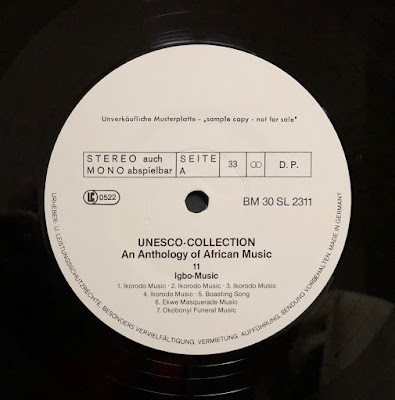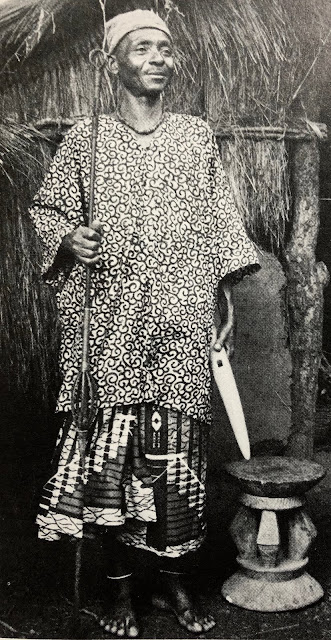Nigeria III - Igbo Music – An Anthology of African Music – BM 30 L 2311 – recorded by David W. Ames, 1963-1964 and 1975 (LP)
The Igbo (or Ibo) People in Southeastern Nigeria are the country’s third largest ethnic group after the Hausa and the Yoruba. These recordings highlight the central role played by traditional Igbo Mmanwu masquerades, connected with the invisible world of ancestors and deities, which invite the entire community to honor the dead or pray to the deities for a successful harvest, and have a good time. “More than a source of entertainment, they are an integral part of traditional religion, not only intensifying religious experience and ritual, but their performance is an act of worship itself,” according to David Ames. Each masquerade is also attached to a secret society, each with its own orchestra.
This Bärenreiter-Musicaphon LP recorded in Obimo villages, Enugu
State, in 1963-1964 and 1975, presents:
- Ikorodo orchestras, featuring percussion, bells and four polyphonic
side-blown calabash horns. Women traditionally dance to Ikorodo masquerade
music and may even ritually challenge the masquerador with their dancing (A1-A4).
- A boasting song performed by the Ekwe society band at Chief
George Eze Nwa-eze’s second burial ceremony (A5).
"If the sun shines
We did it! (choir)
If the rain falls
We did it! (choir)
If people eat food
We did it!" (choir)
- Ekwe masquerade music for the king of the masks and a Chief’s
second burial ceremony, during which the female keeper of the Ekwe shrine was the
only person allowed to dance in the presence of the masquerader. The orchestra
includes a side-blown elephant tusk horn, male voices, drums, percussion, a metal
gong, and an oso (or ugele) flute (A6).
- Okobonyi funeral music with large wooden slit gongs, percussion,
an elephant tusk horn, two small wooden slit gongs, a notched flute, and a
whistle. Ozo titleholders dance to the rhythms of the Okobonyi before the body
of an Ozo is taken to the grave (A7).
- Egara music, with Ezema Nwodo Eze, the region’s best opu-ozara elephant tusk horn player,
praise singing, gongs and percussion (B1).
- Raft zither music: singing, three 13-stringed thumb-plucked obos raft zithers, four metal gongs and
a wicker rattle (B2).
- Wrestling music with two mgbereke
percussion sticks, an open cylindrical oke
abia drum and an ogene metal gong
during an annual inter-village wrestling competition (B3).
- Igede Eze music played to pay tribute to the illustrious Eze of
old and the ancestors, with two large igede
single-membrane barrel-shaped drums, two huge iron double-gongs and drums (B4).
- Grinding song for a feast like the New Yam Festival (B5).
- Ogwyume song with a mbira
thumb-piano accompaniment (B6)
Les Igbo (ou Ibo) du sud-est du Nigéria constituent le troisième plus grand groupe ethnique du pays après les Hausa et les Yoruba. Ces enregistrements témoignent du rôle central joué par les mascarades Igbo Mmanwu, liées au monde invisible des ancêtres et des divinités auxquelles toute la communauté est conviée pour honorer les morts ou demander les bénédictions des puissances célestes pour des récoltes abondantes, et festoyer. « Plus qu’une source de divertissement, les mascarades font partie intégrante de la religion traditionnelle, non seulement en intensifiant l’expérience et les rituels religieux, mais du fait que leur exécution est un acte sacré en soi », selon David Ames. Chaque masquarade est rattachée à une société secrète avec son propre orchestre.
Ce disque
Bärenreiter-Musicaphon enregistré dans les villages d’Obimo, Enugu State, en
1963-1964 et 1975, présente :
- Musique de l’Ikorodo,
avec percussions, cloches et quatre trompes traversières en calebasse. Les
femmes dansent traditionnellement sur la musique de mascarade d'Ikorodo et peuvent
même se mesurer rituellement avec la danse du mascaradeur (A1-A4).
- Chant de forfanterie
interprétée par l’orchestre de la société secrète Ekwe à l’occasion de la
deuxième cérémonie funéraire du chef George Eze Nwa-eze (A5).
« Si le soleil brille
C’est grâce à nous (choeur)
Si la pluie tombe
C’est grâce à nous (choeur)
Si les gens mangent de la
nourriture
C’est grâce à nous » (choeur)
- Musique de mascarade
d’Ekwe pour le roi des masques lors de la deuxième cérémonie funéraire d’un
chef au cours de laquelle la gardienne du sanctuaire d’Ekwe était la seule
personne autorisée à danser en présence du mascaradeur. L'orchestre comprend
une trompe traversières en défense d'éléphant, des voix d’hommes, des tambours,
des percussions, un gong en métal et une flûte oso (ou ugele) (A6).
- Musique funèbre, Okobonyi
avec des grands gongs en bois, des percussions, une trompe traversière en
défense d'éléphant, deux petits gongs en bois, une flûte entaillée et un
sifflet. Les détenteurs du titre d’Ozo dansent au rythme de l’Okobonyi avant la
mise en terre du corps d’un Ozo (A7).
- Musique de l’Egara,
avec Ezema Nwodo Eze, meilleur joueur de cor de défenses d’éléphants opu-ozara
de la région, chants de louange, gongs et percussions (B1).
- Musique pour cithare en
radeau: chant, trois cithares en radeau obos
à 13 cordes, quatre gongs en métal et un hochet en osier (B2).
- Musique pour la lutte
avec deux baguettes percussives mgbereke,
un tambour cylindrique ouvert oke abia
et un gong en métal ogene à
l’occasion d’une compétition de lutte inter-village annuelle (B3).
- Musique de l’Igede Eze
jouée pour rendre hommage à l'illustre Eze, des anciens et des ancêtres, avec
deux grands tambours igede, deux
gongs imposants et des tambours en fer (B4).
- Chant à piler à
l’occasion d’une grande fête tel le New Yam Festival (B5).
- Chanson de l’Ogwyume
avec un accompagnement au mbira (kalimba ou sanza) (B6)
- Chant de jeu au clair
de lune avec des garçons et des filles dans un jeu d’appels-réponses sur la
place du village à la pleine lune (B7).
“I believe in the complexity of the human story and that there’s
no way you can tell that story in one way and say, 'This is it.' Always there
will be someone who can tell it differently depending on where they are
standing; the same person telling the story will tell it differently. I think
of that masquerade in Igbo festivals that dances in the public arena. The Igbo People say, 'If you want to see it well, you must not stand in one place.' The
masquerade is moving through this big arena. Dancing. If you’re rooted to a
spot, you miss a lot of the grace. So you keep moving, and this is the way I
think the world’s stories should be told—from many different perspectives.”*
Chinua Achebe (1930-2013), from an interview The Paris Review, 1994
Chinua Achebe (1930-2013), from an interview The Paris Review, 1994
Photographs below are from Arts du Nigéria: Collection du Musée des Arts d'Afrique et d'Océanie - Paris exhibition April-August 1997, RMN, 1997:
Janus-faced night mask, Igala or Igbo




















I keep getting an error message on this download, has never happened before on your site - thanks.
ReplyDeleteThank you for bringing this to my attention. Just downloaded both the Flac and MP3 without any problem. The best thing is to try again or download via a different browser. Good luck
Deletethank You!
ReplyDeleteThank you very much for this to me unknown recording. Again it shows that you have a real valuable blog!
ReplyDeleteThank you for these gems.
ReplyDelete